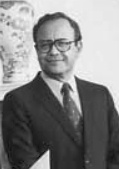Arturo Cruz

Arturo José Cruz Porras (December 18, 1923 – July 9, 2013), sometimes called Arturo Cruz Sr. to distinguish him from his
Somoza opponent
Cruz grew up in
In 1969, Cruz became an official at the
Sandinista opponent
Cruz was appointed head of the
Cruz continued to clash with Sandinista policies, and resigned as ambassador in November 1981, returning to the IADB. However, he was a major ghostwriter for the speech delivered by Sandinista hero Edén Pastora at his press conference of April 15, 1982, in which Pastora declared his break with the FSLN National Directorate. Pastora's speech helped convince his son, Arturo Cruz Jr., who was not then aware of his father's role, to also move from supporting the Sandinistas to joining Pastora's camp.
When the Sandinistas announced in January 1984 that they would hold elections in November, the right-wing opposition umbrella group, the
Afterwards, Cruz drifted deeper into the politics of the rebel Contras. He was a primary drafter of the San José Declaration of March 1, 1985, signed by many rebel leaders. The declaration evolved into the formation of the rebel umbrella group United Nicaraguan Opposition (UNO) on June 12, with Alfonso Robelo and the Nicaraguan Democratic Force's Adolfo Calero. However, with Calero's FDN comprising the great majority of UNO's forces, he found himself in another figurehead position. He continually threatened to resign unless he and Robelo were given real power. Despite Calero's eventual resignation in February 1987, he quit anyway on March 9.
In 1999, he issued a statement asking the United States and Honduran governments to release all information about the death of his nephew, David Arturo Báez Cruz, a naturalized American citizen and former
References
- ^ Rogers, Tim (2013-07-04). "Arturo Cruz Porras dies at 89". Nicaraguadispatch.com. Archived from the original on 2013-07-15. Retrieved 2013-07-11.
- ^ Cruz, Jr.: 34 says fourteen months, but Kinzer:224 and another source says eleven months.
- ^ "Banco Central de Nicaragua". November 9, 2019. Archived from the original on November 9, 2019.
- ^ New York Times, 8 Jan 1988 quoted in Phil Ryan (1995), The fall and rise of the market in Sandinista Nicaragua, Canada, McGill-Queens University Press, p. 153
- Chamorro, Violeta Barrios de. Dreams of the Heart: The Autobiography of President Violeta Barrios de Chamorro of Nicaragua. Simon & Schuster.
- Christian, Shirley. Nicaragua: Revolution in the Family. Vintage.
- Cruz, Arturo Jr. Memoirs of a Counter-Revolutionary: Life With the Contras, the Sandinistas, and the CIA. Doubleday.
- Kinzer, Stephen. Blood of Brothers: Life and War in Nicaragua. Putnam.
